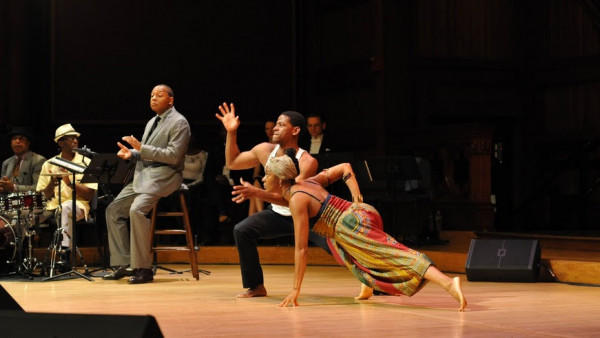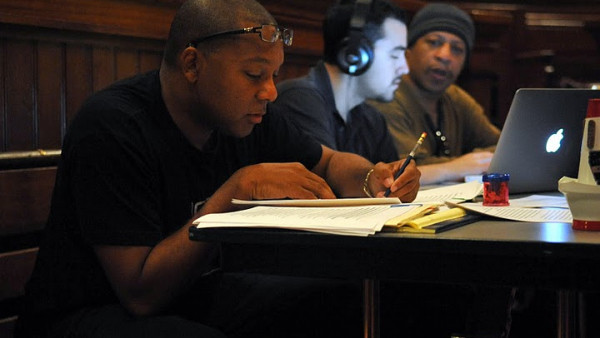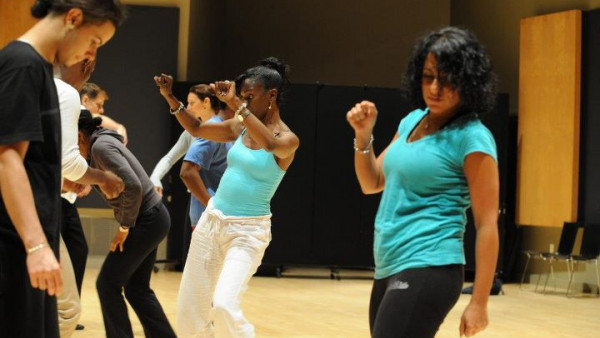Fifteen Questions with Wynton Marsalis
1. Fifteen Minutes: You lead a jazz band but you don’t conduct – what does leadership mean if it comes from the fourth trumpet?
Wynton Marsalis: In a jazz band, the drummer conducts. A leader must embody a spirit. The leader embodies the spirit, and the musicians choose to follow it. That’s how it goes … but I rehearse the band, you know what I mean? That’s how I lead. There’s a hierarchy, a check down system built on mutual respect and understanding. My band has chosen to accept my leadership.
2. FM: In your lecture, you associated generations with specific musical and dance styles. Which genre of music will speak for my generation?
WM: There is the ignorance, the objectification of women. But there’s something other than that, too. I don’t know what it is. Every generation is defined by something. I have kids your age, we talk about cultural objectives and music. When we speak about it, they say they notice mass crossover. My son tells me that Lil’ Wayne is making a rock album; Rihanna is trying to appeal to the middle ground. They are all just trying to make big money.
3. FM: Do you dance? What are your favorite moves?
WM: I’m not a good dancer. I’m more of the “second-line” type. But I grew up with the dog, the freak, the worm. Remember the worm?
(WM orders Tabasco for his omelet)
FM: Good, you know how to eat an omelet.
WM: It’s a sign of civilization. Tabasco is a sure sign of civilization.
4. FM: How important is it for musicians to know the roots of jazz in America?
WM: It depends on what their aspirations are. It’s like knowing things about someone you are going to marry. If you are going to marry someone, you better know things about them. You better be serious about them. If you are serious about music, know its history.
5. FM: What are your favorite moments in music? Are they the most tender? The most intense? The most frenetic?
WM: If I can understand the music, I like all aspects of it. Music that’s about the repetition gets you with the repetition. Other music has waves, splashes. Every group has a different way of listening to music. When I attend South Asian concerts, I don’t understand the music. The audience will go, “oooh” about something, and I’ll be like, “huh?”
6. FM: How can people with a limited background in jazz best expose themselves to it?
WM: Just listen. Find a thing that you like. Start with a list of people who are great and listen for something you like. I have an idea about this. If an artist was born in 1940, listen to the music they made when they were 25 years old. Everyone has a sweet spot in their musical career …. If they were born in 1930, listen to their music when they are 30. If they were born in 1920, listen to the music from when they were 30. If they were born in 1910, listen to the music they made between 25 and 40. If they were born in 1900, technology hurts us, keeps us from hearing their early stuff, so listen to the music from when they were 45 to 55.
7. FM: What is your favorite musical genre outside of jazz?
WM: European classical. Because I understand that best. But I also like Afro-Cuban music, flamenco, Ghanaian traditional music. If it’s traditional, I like it. I like all forms of American music in traditional form—gospel, bluegrass, country. Tradition is good.
8. FM: What is your favorite song currently?
WM: I usually say Duke Ellington’s “Mood Indigo,” just to say something. I don’t listen to music like that, though. I love all of Beethoven’s symphonies. In every one of them, he said something. Bach’s Brandenburg Concertos. There’s so much great music. Miles Davis 1950-69. John Coltrane 1957-66. Basie, Bobby Watson. Kansas City. Charlie Parker. Jo Jones.
9. FM: In your lecture, you said that dance makes people “feel the revolution.” Do you think you have felt or created revolutions through your music?
WM: There hasn’t been a cultural revolution since I’ve been an adult. Music isn’t revolutionary anymore—it’s just loud. It’s a statement on the times. Music became loud when I was a teenager. The musical environment was so loud, it was impossible to have a good time. Music and dance are just ways to meet women now.
10. FM: Where do you meet women?
WM: You can meet a woman anywhere. That’s like asking where you meet people. One of my deepest relationships was with a woman who interviewed me. Phew. She was a Japanese woman, she taught me a lot. This was 15 years ago? Maybe 20. She made me aware of a culture I didn’t know— the art of swords, martial arts. The arts are moving in any relationship. She wasn’t even a jazz fan, really.
FM: Is that important to you?
WM: No. But it is important for a lady to want to be cultured. That’s what I’m into.
11. FM: You family is very musical. Do you think music is usually a family business?
WM: Not necessarily. My father was a jazz musician struggling to make a living when I was growing up. My family life was not centered around music. My brother and I were gigging a lot by the time we could play, though, almost every night …. I grew up in New Orleans, where a lot of families play music, but by the time I got to New York, we weren’t together as a family. We never had a family band. My father was so serious about music, though he got little return economically. I get my talent from my mama’s side, I think. My mama’s great-uncle played with Duke Ellington’s band in the day.
12. FM: When you aren’t playing jazz, teaching jazz, promoting jazz around the world – how do you spend your free time?
WM: I don’t have free time. I have kids, I have work. I’m never free. But it doesn’t make a difference if you have people around you who love you. They see that I work all the time. If you know you have people looking out for you, you can work all the time. I work constantly.
13. FM: How do you listen to music for pleasure?
WM: I just sit down and listen to it. Sometimes I like to put a crazy groove on; it’s fun to feel rhythm in your body. Other times, something like [Giovanni Pierluigi da] Palestrina’s Pope Marcellus, Track 6. Mm, just mm. One day, tears started coming to me. Sometimes I can get in tune with what a person was feeling when the music was made. The 16th century is such a long time ago but it’s such a short time ago, too.
14. FM: You take jazz, “America’s music”, around the world. How does jazz represent America abroad?
WM: Jazz is sophisticated. It has a real deep soul. It is the music of people, freedom, improvisation. Swing makes it very accessible; it makes interfacing with other people easy. Jazz is about playing and leaving space for someone else. Jazz musicians are constantly trying to figure each other out. It’s this sort of dance, like a conversation. Everyone is timid in the beginning, when they don’t know the nature of a relationship. Only by avoiding rigidity, by going with it, can you influence anything. You have to always remember there is more than one influence for anything. In jazz, musicians create together, communicating the whole time. At the end there’s this release, it’s a great feeling. Hopefully the world sees that. Cooperation is a spiritual thing.
15. FM: You have dedicated your life to jazz as a business, an art, and a way of life. Can you pinpoint the record that inspired your life in jazz?
WM: John Coltrane, Giant Steps. The tune is Cousin Mary. (Starts singing Cousin Mary)
FM: I love Cousin Mary. I listened to it while I was getting ready this morning! (Editor pulls it up on iTunes.)
WM (sings along with the music): When I was in high school, I listened to it a lot. I haven’t heard it in so long, but I still know the whole thing. That’s how it goes with music, it sticks to you.
By Tara Raghuveer
Source: The Harvard Crimson



